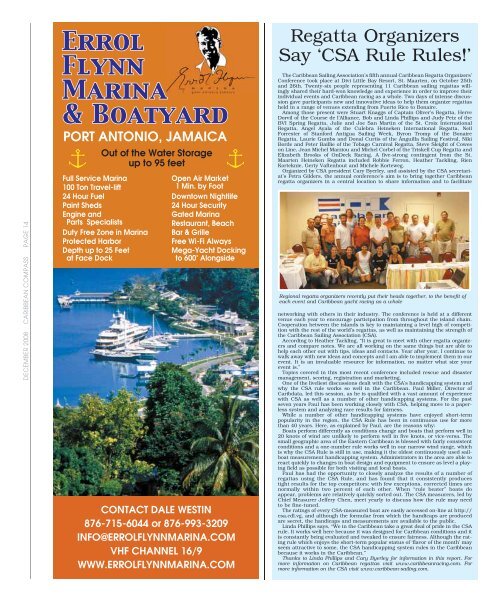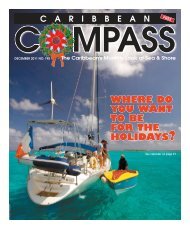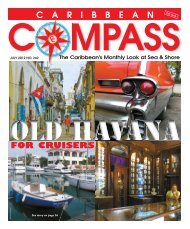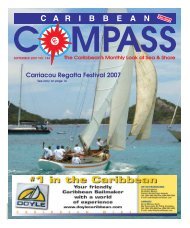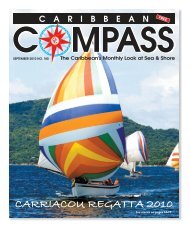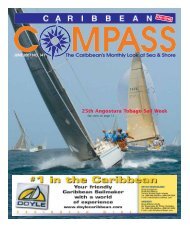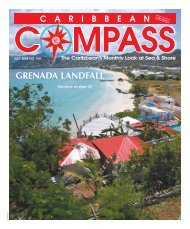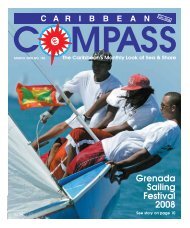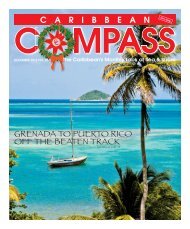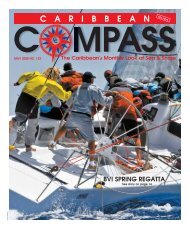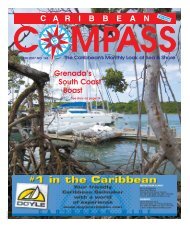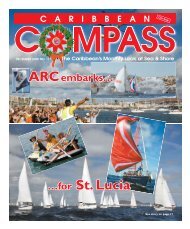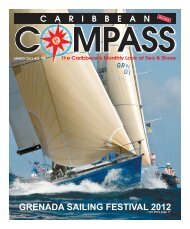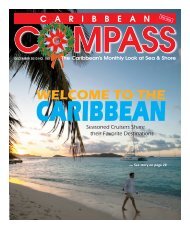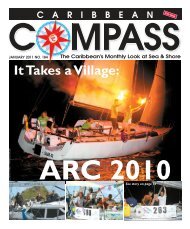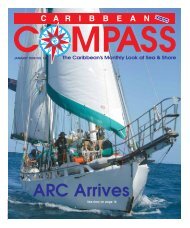TRADITIONAL LAUNCHINg - Caribbean Compass
TRADITIONAL LAUNCHINg - Caribbean Compass
TRADITIONAL LAUNCHINg - Caribbean Compass
Create successful ePaper yourself
Turn your PDF publications into a flip-book with our unique Google optimized e-Paper software.
DECEMBER 2008 CARIBBEAN COMPASS PAGE 14<br />
Errol<br />
Flynn<br />
Marina<br />
& Boatyard<br />
PORT ANTONIO, JAMAICA<br />
Out of the Water Storage<br />
up to 95 feet<br />
Full Service Marina<br />
100 Ton Travel-lift<br />
24 Hour Fuel<br />
Paint Sheds<br />
Engine and<br />
Parts Specialists<br />
Duty Free Zone in Marina<br />
Protected Harbor<br />
Depth up to 25 Feet<br />
at Face Dock<br />
Open Air Market<br />
1 Min. by Foot<br />
Downtown Nightlife<br />
24 Hour Security<br />
Gated Marina<br />
Restaurant, Beach<br />
Bar & Grille<br />
Free Wi-Fi Always<br />
Mega-Yacht Docking<br />
to 600’ Alongside<br />
CONTACT DALE WESTIN<br />
876-715-6044 or 876-993-3209<br />
INFO@ERROLFLYNNMARINA.COM<br />
VHF CHANNEL 16/9<br />
WWW.ERROLFLYNNMARINA.COM<br />
Regatta Organizers<br />
Say ‘CSA Rule Rules!’<br />
The <strong>Caribbean</strong> Sailing Association’s fifth annual <strong>Caribbean</strong> Regatta Organizers’<br />
Conference took place at Divi Little Bay Resort, St. Maarten, on October 25th<br />
and 26th. Twenty-six people representing 11 <strong>Caribbean</strong> sailing regattas willingly<br />
shared their hard-won knowledge and experience in order to improve their<br />
individual events and <strong>Caribbean</strong> racing as a whole. Two days of intense discussion<br />
gave participants new and innovative ideas to help them organize regattas<br />
held in a range of venues extending from Puerto Rico to Bonaire.<br />
Among those present were Stuart Knaggs of Captain Oliver’s Regatta, Herve<br />
Dorvil of the Course de l’Alliance, Bob and Linda Phillips and Judy Petz of the<br />
BVI Spring Regatta, Julie and Joe San Martin of the St. Croix International<br />
Regatta, Angel Ayala of the Culebra Heineken International Regatta, Neil<br />
Forrester of Stanford Antigua Sailing Week, Byron Tromp of the Bonaire<br />
Regatta, Laurie Gumbs and Donal Curtis of the Anguilla Sailing Festival, Niki<br />
Borde and Peter Baillie of the Tobago Carnival Regatta, Steve Sleight of Cowes<br />
on Line, Jean Michel Marziou and Michel Corbel of the Triskell Cup Regatta and<br />
Elizabeth Brooks of OnDeck Racing. A five-strong contingent from the St.<br />
Maarten Heineken Regatta included Robbie Ferron, Heather Tackling, Rien<br />
Korteknie, Gerty Vaftenhout and Michele Korteweg.<br />
Organized by CSA president Cary Byerley, and assisted by the CSA secretariat’s<br />
Petra Gilders, the annual conference’s aim is to bring together <strong>Caribbean</strong><br />
regatta organizers in a central location to share information and to facilitate<br />
Regional regatta organizers recently put their heads together, to the benefit of<br />
each event and <strong>Caribbean</strong> yacht racing as a whole<br />
networking with others in their industry. The conference is held at a different<br />
venue each year to encourage participation from throughout the island chain.<br />
Cooperation between the islands is key to maintaining a level high of competition<br />
with the rest of the world’s regattas, as well as maintaining the strength of<br />
the <strong>Caribbean</strong> Sailing Association (CSA).<br />
According to Heather Tackling, “It is great to meet with other regatta organizers<br />
and compare notes. We are all working on the same things but are able to<br />
help each other out with tips, ideas and contacts. Year after year, I continue to<br />
walk away with new ideas and concepts and I am able to implement them in our<br />
event. It is an invaluable resource for information, no matter what size your<br />
event is.”<br />
Topics covered in this most recent conference included rescue and disaster<br />
management, scoring, registration and marketing.<br />
One of the liveliest discussions dealt with the CSA’s handicapping system and<br />
why the CSA rule works so well in the <strong>Caribbean</strong>. Paul Miller, Director of<br />
Caribdata, led this session, as he is qualified with a vast amount of experience<br />
with CSA as well as a number of other handicapping systems. For the past<br />
seven years Paul has been working closely with CSA, helping move to a paperless<br />
system and analyzing race results for fairness.<br />
While a number of other handicapping systems have enjoyed short-term<br />
popularity in the region, the CSA Rule has been in continuous use for more<br />
than 40 years. Here, as explained by Paul, are the reasons why:<br />
Boats perform differently as conditions change and boats that perform well in<br />
20 knots of wind are unlikely to perform well in five knots, or vice-versa. The<br />
small geographic area of the Eastern <strong>Caribbean</strong> is blessed with fairly consistent<br />
conditions and a one-number rule works well in our narrow wind range, which<br />
is why the CSA Rule is still in use, making it the oldest continuously used sailboat<br />
measurement handicapping system. Administrators in the area are able to<br />
react quickly to changes in boat design and equipment to ensure as level a playing<br />
field as possible for both visiting and local boats.<br />
Paul has had the opportunity to closely analyze the results of a number of<br />
regattas using the CSA Rule, and has found that it consistently produces<br />
tight results for the top competitors: with few exceptions, corrected times are<br />
normally within two percent of each other. When “rule beater” boats do<br />
appear, problems are relatively quickly sorted out. The CSA measurers, led by<br />
Chief Measurer Jeffery Chen, meet yearly to discuss how the rule may need<br />
to be fine-tuned.<br />
The ratings of every CSA-measured boat are easily accessed on-line at http://<br />
csa.cdl.vg, and although the formulae from which the handicaps are produced<br />
are secret, the handicaps and measurements are available to the public.<br />
Linda Phillips says, “We in the <strong>Caribbean</strong> take a great deal of pride in the CSA<br />
rule. It works well here because it was designed for <strong>Caribbean</strong> conditions and it<br />
is constantly being evaluated and tweaked to ensure fairness. Although the rating<br />
rule which enjoys the short-term popular status of ‘flavor of the month’ may<br />
seem attractive to some, the CSA handicapping system rules in the <strong>Caribbean</strong><br />
because it works in the <strong>Caribbean</strong>.”<br />
Thanks to Linda Phillips and Cary Byerley for information in this report. For<br />
more information on <strong>Caribbean</strong> regattas visit www.caribbeanracing.com. For<br />
more information on the CSA visit www.caribbean-sailing.com.


